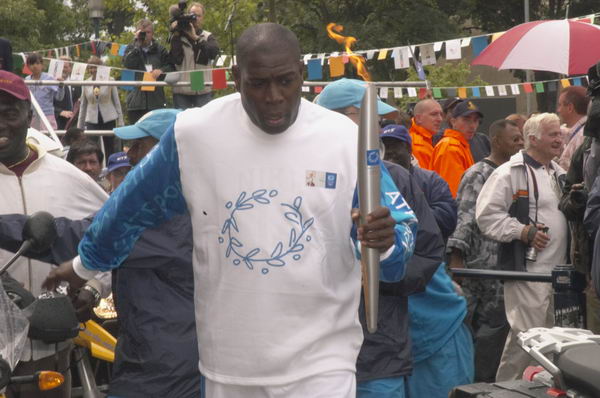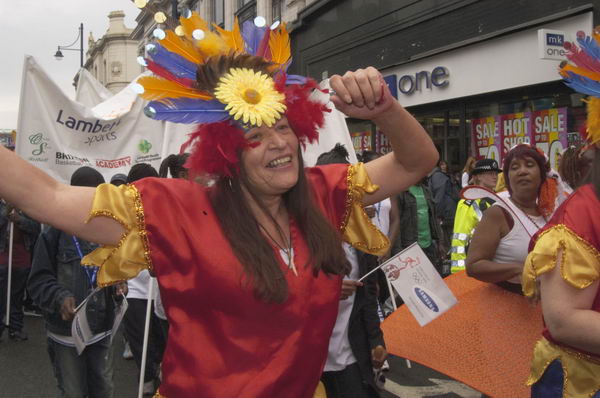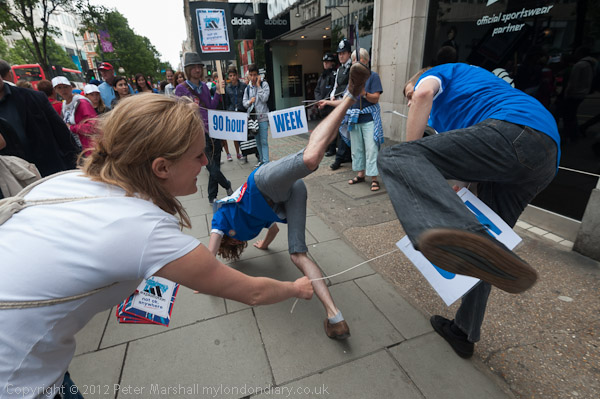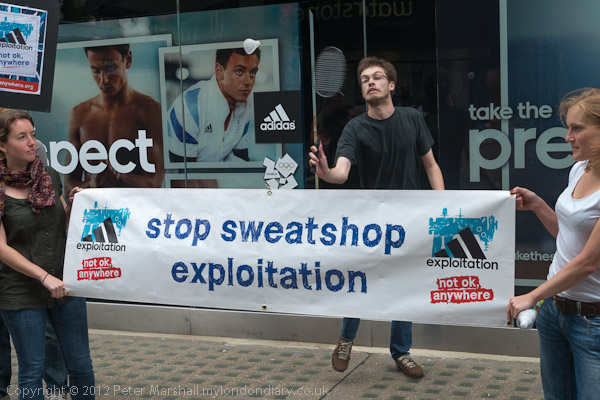I breathed a sigh of relief late on Sunday evening as the closing ceremony for the London 2012 Olympics lumbered to its end. Not of course that I was watching or even listening to it – Radio 3 has one of its rare jazz programmes late on Sunday nights – but the posts had been rolling into Facebook, mainly rather negative comments about the various groups involved. But perhaps now we can have our city back. Though of course we now have the Paralympics to look forward to, with disabled protesters promising to play a better game than their able-bodied counterparts.
If I’d lived in the east of London, I might even have ventured out for the fireworks, perhaps finding a good viewpoint, but it was all happening too late for me to easily make my way home. Unlike many I’d not got caught up by the ‘Olympic Spirit’, and had hardly seen more than the odd second or two (not having a TV in the house helps) though I’d been pleased to hear some of the stories of success of some of the athletes, even if the repeated playing of commentators shouting hoarsely about British successes soon got rather wearing. But I was genuinely pleased to see British cyclists doing well (even if I still think the Keirin is a ridiculous event) though rather more pleased over their success earlier in the Tour de France, after which the Olympics seemed slightly small beer. But there are certainly some events I can’t take seriously as sport (like synchronised swimming and the one somebody described our medal winner as being rewarded for ‘looking slightly royal on a horse’) and others such as boxing I’d like to see banned.
But there are other aspects of the Olympics – not the sport – that worried me. Seeing British police strolling through crowds carrying sub-machine guns still makes me feel I’m in the wrong country, and the truly unnecessary ‘security’ – like the closing of the canal towpath for a couple of months.

Frank Bruno carries the Olympic torch in Brixton, 2004
I photographed the Olympic torch relay through Brixton in 2004, where Frank Bruno and Davina McCall were running with it through the streets. Everyone with them was local and was having a good time. Security was virtually non-existent and certainly unobtrusive, as was the corporate presence – Samsung were there and handing out corporate flags and other stuff to the kids, but that was about it.

Brixton celebrates the Olympic torch relay in 2004
Various local music and carnival groups followed the torch along the High Street and it was bright and colourful and fun for those taking part and watching.
This year it seemed to have a very different atmosphere, and where I saw it local participation seemed limited to standing on the pavement at the side of the road as corporate floats rolled past in front of the torch bearer who was flanked with what looked like a dozen or so plain clothes police.
So many stories seem to be about the control of people by corporate interests and the branding police. Long established businesses with Greek connections trading for years under the name ‘Olympic’ being forced to change their names, butchers, bakers and florists being told to remove window displays using the 5 rings, and so many more. I was also saddened by the removal of much of the graffiti that characterised some of the areas surrounding the site, and by some of the stories I heard about rough sleepers and others being ‘tidied up’ in central London.
Various arrests of people, often who had not actually committed an offence, so that the police could impose bail conditions which included staying out of the Olympic boroughs during the games and after. Probably most of them will find any charges against them dropped – because there never really was a case. It will be interesting to see exactly how many of the 182 cyclists arrested on the night of the opening ceremony actually end up in court. Wide-ranging restrictions were imposed on freedom of association in the area around the Olympics, and in particular against the local youth.
But there were some good aspects apart from the sport. G4S showed that it isn’t a good idea to rely on companies like them to provide services – and the military who came to take their place seemed to have done the job far better than they would have done. (And their uniforms cost considerably less than the average of £6,250 per uniform the government had negotiated with G4S – a figure which shows just how using private companies like this saves money!) The Olympics did at least give an opportunity for the spotlight to be turned on the activities – away from the games – of some of the sponsors, and I’ve previously written about some of the actions against Dow, BP and others. Although the restrictions in place prevented much actually happening in Stratford.
On Saturday 4 August, War on Want took advantage of the games to highlight the corporate malpractices of the official sportswear partner of London 2012, Adidas, holding their own games in a protest outside the company’s main Oxford St store.

War on Want athletes face the Adidas hurdles of poverty wages, union busting and 90 hour week
The hurdles race was perhaps the most spectacular, highlighting the allegations that some workers producing Adidas clothing in China are forced to work 90 hour weeks, and that workers in Indonesia and Sri Lanka are paid poverty wages – some as low as 34p an hour – and many are told they will be sacked if they complain or try to join a union. A PR company working for Adidas came to talk to me and sent me their statement denying this, but this seemed only to relate to their workers in Bangladesh and War on Want’s evidence came from reliable sources.
Badminton was another sport involved in the protest, having got some bad publicity earlier in the week when some of the players deliberately played to lose – and when both sides were doing so it became obvious. War on Want’s playing perhaps reflected this, although the women did rather better than the men.

Trying to lose at Badminton with the ‘stop sweatshop exploitation’ banner as net
More about the protest and more pictures in Adidas Stop Your Olympic Exploitation on My London Diary.
________________________________________________________
My London Diary : Buildings of London : River Lea/Lee Valley : London’s Industrial Heritage
All photographs on this and my other sites, unless otherwise stated are by Peter Marshall and are available for reproduction or can be bought as prints.
To order prints or reproduce images
________________________________________________________